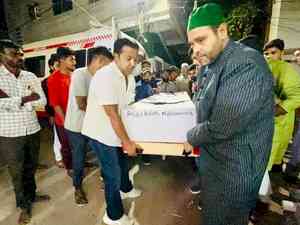RE-LAUNCH: Badal re-launches Bhai Ghanhya Sehat Sewa Scheme
Author(s): City Air NewsChandigarh, November 24, 2012: In a bid to provide the cashless health care facilities and treatment to the members of the Cooperative societies and their family members across the state, Bhai Ghanhya Trust under...

Chandigarh, November 24, 2012: In a bid to provide the cashless health care facilities and treatment to the members of the Cooperative societies and their family members across the state, Bhai Ghanhya Trust under the Chairmanship of Punjab Chief Minister Parkash Singh Badal had re-launched the Bhai Ghanhya Sehat Sewa Scheme for a period of another year with effect from November 20, 2012.
Disclosing this here today, a spokesperson of the Chief Minister’s Office said that the scheme would remain operative up to November 19, 2013. ICICI Lombard G.I.C. had been appointed as Insurer after inviting tenders for the Scheme which had appointed MD India Healthcare Services Ltd. as Third Party Administrator (TPA) to implement the Scheme. Each beneficiary under the scheme was issued a photo I-card having unique number to be presented by him while getting treatment in the net-work hospitals approved under the scheme. Every beneficiary was entitled to cashless treatment up to Rs. 1.5 lakh on family floater basis in any approved hospital and on re-imbursement basis in any government hospital in Punjab and Chandigarh for which he was required to submit the claim within 45 days from the date of discharge from the hospital. Each member and employee of any cooperative society in the State was eligible for enrolment under the scheme.
The spokesperson said that all In-door treatments requiring hospitalisation exceeding 24 hours including the pre-existing diseases were covered under the scheme subject to the terms and conditions of the scheme. Some OPD procedures like dialysis, chemotherapy, tonsillectomy, cataract, radiotherapy, lithotripsy etc. were also covered under the scheme. Each female beneficiary giving birth to a girl child in an approved or government hospital was entitled to an incentive of Rs. 2,100 under the scheme. Newly born child was covered under the scheme up to six months without payment of any additional premium subject to a maximum of Rs. 25,000 including maternity expenses of the mother.
While inaugurating the workshop of network hospitals here, Financial Commissioner Cooperation and Vice- Chairman of the Trust Viswajeet Khanna informed that nearly 85,000 beneficiaries have availed treatment worth Rs. 109 crore during the previous four policy plan periods. He, further informed that in order to improve the system relating to grant of authorisation for treatment the system of e-authorisation had been designed for the current scheme according to which the net-work hospitals instead of sending the request through fax will be sending the online request for treatment to www. mdindiaonline.com of the TPA.
Khanna called upon the hospitals to provide hassle free cashless treatment to the beneficiaries. While assuring the hospitals of quick disposal of their issues if any, he informed that serious view would be taken in case any hospital violated the terms and conditions of the scheme. Eight hospitals were de-panelled under the previous scheme resulting in their ineligibility for empanelment under the current scheme. Later on the TPA made a presentation before the representatives of the hospitals and answered their queries relating to the scheme.
Meanwhile, Chief Executive Officer of the Trust K.S. Palne also informed that the premium for main member for the current scheme was Rs. 1190/- as compared to 1480/- for the previous scheme. As many as 1.30 lac families having 3.06 lac beneficiaries had been enrolled under the Scheme. Likewise, 193 private hospitals which included super-specialty hospitals like Shri Guru Ram Dass Hospital, Vallah, Hero Heart Hospital (for heart aliments only), Max hospital Bhatinda have been empanelled under the scheme for providing cashless treatment to the beneficiaries.

 cityairnews
cityairnews 















